
Skip Elsheimer’s interest in film and video dates back to his childhood. As a young man he owned a 16mm projector but could never get it to work. He shot film for school projects but was dissatisfied with the time it took to view his results. “No immediate gratification squashed my motivation” he said in a February 19, 2013 interview. He had always been a collector of such ubiquitous materials as comic books, coins, stamps, and records. However, in college at North Carolina State University in Raleigh, NC in the 1990s, his interest in collecting reached a more massive scale, both space- and numbers-wise. It happened when he bought six palettes of audio and video equipment at a University of North Carolina Greensboro (UNCG) auction that included U-Matic video decks, an open-reel tape machine, and a working 16mm projector. He was not a stranger to oversized collections at this stage in his life as he had already gotten into collecting large office machinery (copy machines and other discarded tools), but prior to this purchase, film had not been a huge part of his life.
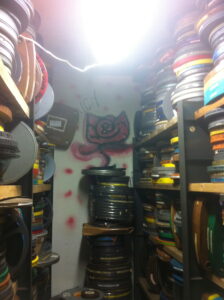
A trip to a flea market netted him a couple of 16mm educational film prints but also, and more importantly, a tip from the seller about an auction that featured quite a few more films. Despite not being able to attend the auction — he had to go to work — he asked his roommates to go in his place. “I’ll pay you back” he said, and, upon returning home, was greeted by a pile of 500 educational films with subjects ranging from drinking and drugs to driver’s ed and Duck and Cover from the UNCG Department of Human Resources. It cost him $50.
“Something clicked that these were awesome,” says Elsheimer, and his quest to build the massive 24,000+ educational film collection of A/V Geeks began. “Schools were beginning to make room for the computer lab and dumping films for space” he said, and recounts buying up huge lots of film from educational and other institutional entities all over North Carolina. Soon enough he had acquired most of North Carolina’s otherwise-potentially-doomed-for-the-dumpster collections. As college roommates started getting married, going to grad school, and otherwise moving out of their shared house, Elsheimer realized that if he was going to keep the thousands of films he had amassed, it was time to find them a home. He did, in a former boarding house in Raleigh, NC, where the archive lives to this day.
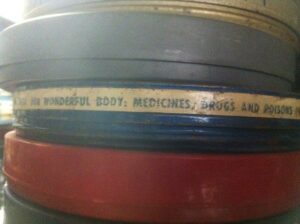
“I got [the films] for performance in the first place, to show behind bands,” says Elsheimer, noting that his collection was born with the idea that these films – however dated, faded, or forgotten – were still of interest, despite being orphaned by their previous owners. But their interest, he noted, extended beyond a moving psychedelic backdrop for music. Elsheimer started inviting friends over on Sundays for beer and film viewing, a tradition that remains to this day. “I enjoy [watching] them and see enjoyment in others when the watch them,” he said. Prior to his quest to collect and rescue film he had created zines and worked with a record label, two enterprises whose reason for being are to get content to the widest variety of people. Thus, A/V Geeks was born, a film archive based on the idea that, as Elsheimer says, “access is the first step to preservation.”
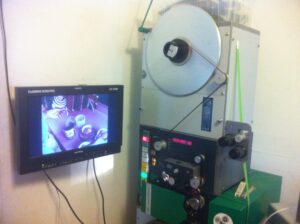
In order to fulfill the goal of making his 24,000 educational films as accessible as possible, Elsheimer has spent almost two decades becoming a recognized force for reformatting in the world of media preservation. Much of the reason these films are not accessible is because many never made it to consumer friendly formats like VHS, and even if they did, their material may be considered too irrelevant for modern formats. Reformatting equipment is expensive and experience is, too. “I learned the hard way,” said Elsheimer, referring to the fact that his knowledge of the field has put him in demand as a consultant for other archives who are seeking help with their digitization projects. But one of the goals of the work of A/V Geeks is to get as much public domain material as possible on popular media delivery websites like YouTube, The Internet Archive, and Vimeo, to ensure the most amount of views by the widest audience. In 2012 Elsheimer initiated an IndieGoGo campaign to digitize 100 miles of public domain film. He enticed donators with a list of films that he not only thought they would be interested in, but that he was also interested in. “Instead of me raising money to pay the bills I can raise money to digitize what I want to digitize,” he said. As of February 24, 2013, the campaign has raised over $20,000.
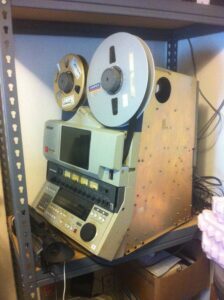
A/V Geeks is not only a giant, privately owned educational film archive but also a vendor of digitization services. They offer 8mm, Super8, 16mm, and 35mm reformatting services, as well as a variety of professional and consumer level video formats, including VHS, SVHS, Betamax, Umatic, and 1″ open reel. A/V Geeks also offers digital file reformatting, DVD duplication, and video transcoding to digital media. Elsheimer’s biggest client is the Internet Archive, particularly Geoff Alexander of the Academic Film Archive of North America and Rick Prelinger of the Prelinger Archives. Universities – his alma matter North Carolina State University and neighboring Durham’s Duke University, among others – have hired A/V Geeks for larger scale reformatting services. While higher-profile vendor activity nets more money than consumer services like home movie digitization, Elsheimer feels its just as important as such activity “imparts ideas about archiving to individuals.” Outside of digitization services Elsheimer puts this belief to practice as the president of the Center for Home Movies.
To further their mission of access, Elsheimer takes treasures from the A/V Geeks archive on the proverbial road. He regularly shows films at Kings Barcade in Raleigh, typically a rock venue, in addition to more (or less) traditional cinema environments. He also packages some of the public domain films into fun, thematic DVD sets, monetizing the content and also giving him something to sell at merchandise tables while touring and on his website. “I think the most important component of preservation is access” he says. “If you aren’t actually doing something to give access to people to make it important or introduce it to the world then you’re not doing preservation in the grand sense. It’s great keeping the original around … but there are ways now to share that information without impacting the original object by putting them online and making them available to someone even in another part of the world. That stuff is really important.” He continues “I could pay to have something preserved and it could sit on a shelf and no one would know, so what’s the point? Spend the time, energy, and money, and cheerlead it.”
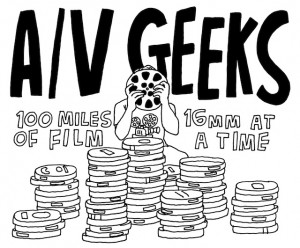
~ Jason Evans Groth
Leave a Reply